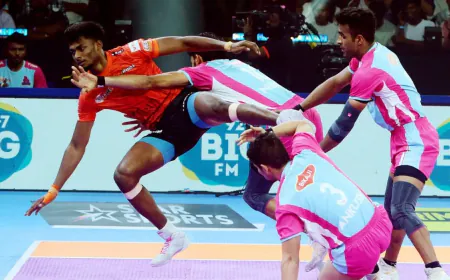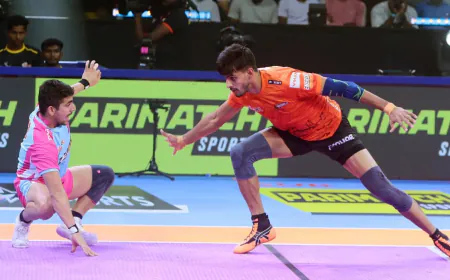WWE Hall Of Famer The Undertaker Explains Detriment Of Wrestlers' 'Gladiator Spirit'
A Call for Change in Sports Culture As the podcast continued, The Undertaker and Booker T discussed the need for a cultural shift within professional sports. Athletes, coaches, and organizations must prioritize health and safety over the relentless pursuit of glory. The stigma surrounding injuries, particularly concussions, often leads to athletes ignoring warning signs and risking their futures.

WWE icon Mark "The Undertaker" Calaway has opened up about the adverse effects of the gladiatorial spirit prevalent among wrestlers and other athletes, highlighting its impact on their health and well-being. In a recent episode of the "Six Feet Under" podcast, The Undertaker sat down with fellow Hall of Famer Booker T to discuss various topics, including the critical issue of concussions in sports.
The Gladiator Mentality in Sports
During the podcast, The Undertaker addressed the mentality that athletes, particularly those in contact sports like football, wrestling, and mixed martial arts (MMA), often possess—a mentality he refers to as the "gladiator spirit." He explained that while this fierce determination can drive athletes to excel, it can also have detrimental effects on their health, especially when it comes to injuries like concussions.
"We're all kind of gladiators. If you're in football, you're in wrestling, you're in boxing, you're in MMA, you have kind of a gladiator spirit, and that sometimes can be the absolute worst thing for you," The Undertaker stated. This mentality can prevent athletes from acknowledging their injuries and seeking the medical attention they may desperately need. He elaborated on his own experiences, reflecting on how he used to embrace the idea of enduring pain and pushing through injuries, believing that it was part of being a warrior in the ring.
A Personal Reflection
The Undertaker shared his personal journey and how his mentality shifted over time. "I always thought ... I had this silly mentality [that] I'm going to go out on my shield, that's how I want to go out," he admitted. However, as he faced the reality of concussions and their long-term implications, he began to reassess his views. "Then you get to that point where things are starting to happen, and then you realize that, 'I'm a young man, and I got a lot of my life left. I have a young wife, I have kids ...' You really have to put all of those things into perspective."
This reflection resonated with many in the wrestling community, as The Undertaker's story exemplifies the struggles that athletes face when balancing their passion for their sport with the need for self-care.
The Case of Tua Tagovailoa
In the discussion, The Undertaker also brought attention to the plight of NFL quarterback Tua Tagovailoa, who has faced multiple concussions in recent seasons. He emphasized the importance of Tagovailoa taking a step back to evaluate why he is experiencing these frequent injuries. The Undertaker's concern for Tagovailoa's health reflects his broader message about the responsibilities athletes have toward their well-being.
Booker T chimed in, acknowledging the difficulty in telling someone who is passionate about their profession to step away. "It's difficult to tell a person who loves what they're doing to not do it anymore," he noted. This sentiment is a common challenge in the world of sports, where passion often overrides rational judgment, leading athletes to take risks that could jeopardize their health.
Concussions and Long-Term Effects
The conversation naturally veered towards the topic of concussions and their long-term effects on athletes. The Undertaker, who had a lengthy and illustrious career in professional wrestling, has not been immune to the dangers associated with head injuries. He recounted a significant concussion he suffered during his iconic match against Brock Lesnar at WrestleMania 30, a moment that many fans remember as a turning point in his career.
In recent years, The Undertaker has revealed that he has no recollection of the match, attributing this to the concussion he sustained. His experience serves as a cautionary tale for current and aspiring athletes, underscoring the importance of understanding the risks associated with their chosen professions.
A Call for Change in Sports Culture
As the podcast continued, The Undertaker and Booker T discussed the need for a cultural shift within professional sports. Athletes, coaches, and organizations must prioritize health and safety over the relentless pursuit of glory. The stigma surrounding injuries, particularly concussions, often leads to athletes ignoring warning signs and risking their futures.
The Undertaker advocated for a more open dialogue about health within sports, encouraging athletes to seek help and support when they need it. He believes that fostering a culture of care and responsibility can help mitigate the negative consequences of the gladiatorial spirit that so many athletes embody.
Mark "The Undertaker" Calaway's insights on the detrimental effects of the gladiatorial spirit provide a critical perspective on the intersection of passion and health in sports. As athletes continue to push their limits, it is essential to recognize the importance of self-care and medical attention. The Undertaker's experiences and reflections serve as valuable lessons for current and future generations of athletes, emphasizing that true strength lies not only in enduring pain but also in acknowledging one's limits and prioritizing overall well-being.
With ongoing discussions about concussions and health in sports, The Undertaker's message resonates now more than ever. As the landscape of athletics continues to evolve, the call for a cultural shift toward prioritizing health and safety remains paramount, ensuring that the next generation of athletes can enjoy long, fulfilling careers while taking care of their bodies and minds.





















































